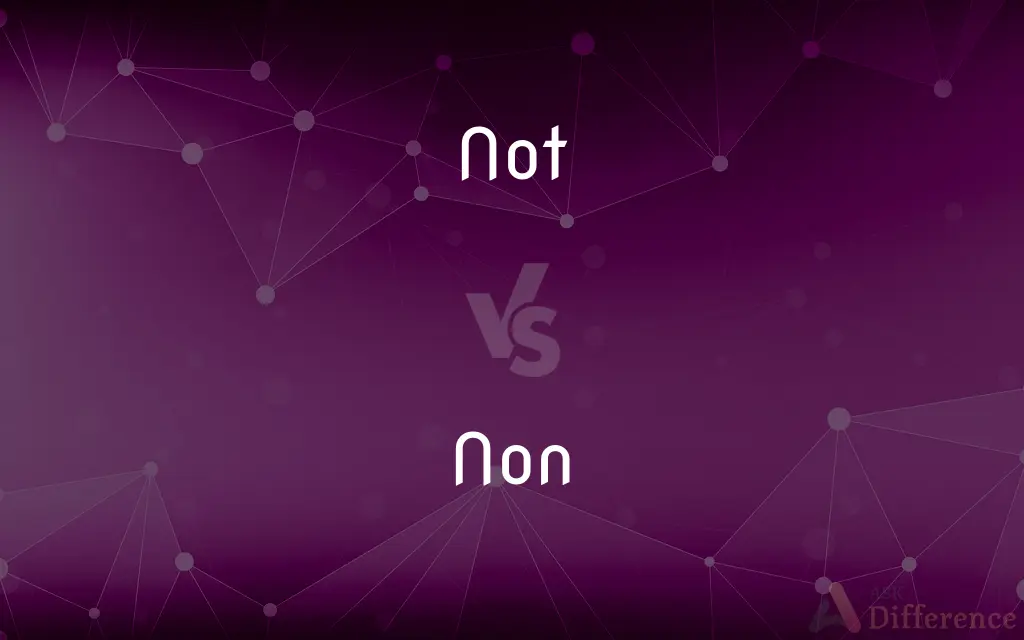Not vs. Non — What's the Difference?
By Fiza Rafique & Urooj Arif — Updated on April 6, 2024
"Not" negates a statement or action, while "non-" is a prefix meaning lacking or absence of something.

Difference Between Not and Non
Table of Contents
ADVERTISEMENT
Key Differences
"Not" is used to negate a verb, adjective, or another adverb, directly altering the meaning of the sentence to express a contradiction or denial. For example, saying "I am not going" negates the action of going. On the other hand, "non-" is a prefix attached to nouns, adjectives, and participles, indicating the absence of a particular quality or element, without negating the action or state itself. "Non-toxic" means something lacks toxic qualities rather than negating the presence of toxicity.
While "not" can change the truth value of an entire sentence or clause, "non-" modifies specific words to create new terms or concepts that describe the absence or opposite of something. This distinction highlights "not" as a tool for direct negation in sentences, whereas "non-" is used to form adjectives or nouns that inherently lack something.
The use of "not" is more versatile, as it can be applied in various grammatical structures to negate different parts of a sentence, offering a way to express negation in speech and writing flexibly. Conversely, "non-" is limited to creating new words or terms, demonstrating its role in expanding the vocabulary by denoting the absence of characteristics or elements.
"Not" is integral to forming negative sentences in English, a fundamental part of the language's syntax and semantics. In contrast, "non-" serves a more specific function in word formation, helping to expand the lexicon by allowing the creation of words that express the negation or absence of qualities in nouns and adjectives.
"Non-" can also imply neutrality or a middle ground, rather than a direct opposition or negation. For example, "non-partisan" suggests not adhering to any particular party, rather than being against partisanship. This nuance is where "non-" finds its unique utility, differentiating it from the broader, more direct negation offered by "not".
ADVERTISEMENT
Comparison Chart
Function
Negates verbs, adjectives, adverbs
Prefix indicating absence or lack
Usage
To negate actions or states
To modify nouns, adjectives, participles
Example
"I am not going."
"Non-toxic"
Grammatical Role
Adverb
Prefix
Indicates
Direct negation
Absence, lack, or neutrality
Compare with Definitions
Not
Adjective/adverb negation.
The solution was not effective.
Non
Used with nouns/adjectives.
He holds a non-executive position.
Not
Denial or contradiction.
That is not what I meant.
Non
Prefix denoting absence.
The substance is non-toxic.
Not
Negation.
He is not happy about the decision.
Non
Implies neutrality.
The group is non-partisan.
Not
Creates negative sentences.
I am not interested in attending.
Non
Forms new words.
The issue is non-negotiable.
Not
Verb modifier.
They do not want to leave early.
Non
Lack of characteristics.
The material is non-conductive.
Not
A logical operator that returns a false value if the operand is true and a true value if the operand is false.
Non
Obsolete form of none
Not
In no way; to no degree. Used to express negation, denial, refusal, or prohibition
I will not go. You may not have any.
Non
A non-Muslim citizen.
Not
Negates the meaning of the modified verb.
‘Do they know?’ ‘I believe not’ (formal)
Did you take out the trash? No, I did not.
Not knowing any better, I went ahead.
Not
To no degree.
That is not red; it's green.
It's not you, it's me.
Not
Used to indicate the opposite or near opposite, often in a form of understatement.
That day was not the best day of my life. (meaning the day was bad or awful)
It was not my favorite movie of all time. (meaning the speaker dislikes or strongly dislikes the movie)
In the not too distant future my view on the matter might be not a million miles away from yours.
Not
And not.
I wanted a plate of shrimp, not a bucket of chicken.
He painted the car blue and black, not solid purple.
Not
(slang) Used to indicate that the previous phrase was meant sarcastically or ironically.
I really like hanging out with my little brother watching Barney
… not!
Sure, you’re perfect the way you are
… not!
Not
Wot not; know not; knows not.
Not
Shorn; shaven.
Not
A word used to express negation, prohibition, denial, or refusal.
Not one word spake he more than was need.
Thou shalt not steal.
Thine eyes are upon me, and I am not.
The question is, may I do it, or may I not do it?
Not
Negation of a word or group of words;
He does not speak French
She is not going
They are not friends
Not many
Not much
Not at all
Common Curiosities
Can "not" modify nouns directly?
No, "not" modifies verbs, adjectives, and adverbs but not nouns directly. For nouns, negation typically involves "not" in a different part of the sentence or using "non-" as a prefix.
Is "non-" always neutral in its implications?
Often, but not always. It can suggest a lack without implying negativity.
Are there instances where "not" and "non-" create similar meanings?
Yes, in some contexts, they can create similar meanings, but through different grammatical structures.
How does "not" interact with auxiliary verbs?
"Not" often follows auxiliary verbs to form negations (e.g., "is not", "have not").
Can "not" and "non-" be used interchangeably?
No, "not" negates actions or states, while "non-" is a prefix that denotes absence or lack.
How does "non-" affect the meaning of words it precedes?
It indicates absence or lack of the quality described by the root word.
Can "non-" create negative connotations?
While it denotes absence, the connotation depends on the context and the base word.
Is "not" used in formal writing?
Yes, "not" is widely used in both formal and informal contexts.
Can "non-" change the part of speech of a word?
It can turn verbs into adjectives (e.g., "react" to "non-reactive") but generally modifies existing nouns and adjectives.
Do "not" and "non-" have synonyms?
Yes, but their synonyms might vary in specificity and usage context.
Can "non-" be added to any word?
Primarily to nouns and adjectives, but its use is governed by standard usage and sometimes neologisms.
How does the use of "not" impact sentence structure?
It can invert the structure in questions or require auxiliary verbs in negations.
Are there words that only exist with "non-"?
Yes, some words are primarily used or recognized with the "non-" prefix, such as "non-starter".
Can "non-" be prefixed to any adjective or noun?
Mostly, but acceptance depends on conventional usage and clarity.
What's the difference in negation between "not" and "non-" in terms of scope?
"Not" negates the specific action or quality mentioned, while "non-" negates the presence of a characteristic more broadly.
Share Your Discovery

Previous Comparison
Evaluation vs. Analysis
Next Comparison
Seed vs. GrainAuthor Spotlight
Written by
Fiza RafiqueFiza Rafique is a skilled content writer at AskDifference.com, where she meticulously refines and enhances written pieces. Drawing from her vast editorial expertise, Fiza ensures clarity, accuracy, and precision in every article. Passionate about language, she continually seeks to elevate the quality of content for readers worldwide.
Co-written by
Urooj ArifUrooj is a skilled content writer at Ask Difference, known for her exceptional ability to simplify complex topics into engaging and informative content. With a passion for research and a flair for clear, concise writing, she consistently delivers articles that resonate with our diverse audience.
















































